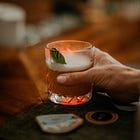3 Key Habits To Kickstart Your Brain Healthy Lifestyle
Fixing these 3 things was a gamechanger for me + discount codes on favorite products
Hello, everyone. Happy New Year! I hope your transition into 2025 was a good one. My holiday was hectic and fun, with lots of houseguests, feasting, and time outdoors enjoying the snow. I embraced time indoors, too: reading by the fire, cooking with my kids, and lounging around with the dogs. This year, I am excited to share even more evolving research to help you take the best care of your brain.
I always say that there’s no such thing as perfection when it comes to brain health. I am a good example of this. I always have a handful of things I am trying to do better. So while I’m not into making New Year’s resolutions (sadly, most of these self-promises are discarded by the end of the month), during the first of the year I like to take inventory of what’s working in my life. And, just like when I declutter my office, I make decisions on what has to go.
Today I am sharing the 3 brain-healthy habits I was struggling with in 2024 and how I figured out a fix. Plus, I am excited to give you a round-up of discount codes on related products. Think of this as a post-holiday gift guide for yourself. When you stock up on brain health staples like creatine and green tea, not only do you save money but you set yourself up for success in the new year.
If you’re new here—welcome! I write about the latest science of how to take care of your brain. I create easy brain-healthy recipes and provide lifestyle strategies to help you reach your brain’s potential. Brain self-care is proven to help with memory and thinking skills at any age. And, taking the best care of your brain has been shown to slow brain aging and protect your cognitive health. The first post of the month is always free. Feel free to share!
I invite you to join as a paying or Founding Member subscriber to access all recipes, brain health guides, and articles, learn first about brain health retreats, and join in Chat and post discussions. In addition, Founding Members join me live on Zoom every three months for a cooking class and brain health topic discussion.
The 6 facets of brain health
Lately I’ve been thinking about brain health like a stool with 4 legs. Brain-healthy diet and exercise are the seat of the stool—these are essential ingredients for protecting cognitive health. While my expertise is in brain health nutrition, I view getting enough of the right type of exercise equally important for cultivating vibrant brain health.
Each leg of the stool is both structural and supportive. This is the kind of stool that will topple over if one leg is compromised. So even though exercise and nutrition are the foundation of a brain-healthy lifestyle, this doesn’t happen without:
Social connection: fostering meaningful relationships throughout life (like I wrote about after visiting blue zone towns in Sardinia)
Stress mitigation: having a personal strategy to counteract the impact of modern life on the brain and the body
Preventive medicine: supporting brain health with optimal heart health, hormonal health, metabolic health, gut health, and mental fitness.
All this year on the newsletter, we’ll be diving deep into all 6 facets of cultivating a brain-healthy life. For today’s newsletter, I’d like to share the 3 things that have really been gamechangers for me, personally.
3 key habits I finally fixed
1. Prioritizing sleep
Between the ages of 25 and 45 I spent my life in a mostly sleep-deprived state, thanks to my career as an ob/gyn physician. While that was unavoidable, now I know how important sleep is for all aspects of my life, especially happiness, productivity, and healthy aging. Good sleep triggers the brain’s glymphatic system, a mechanism that mobilizes and excretes toxins (like the amyloid and tau proteins found in Alzheimer’s). Of course, fixing a sleep issue is easier said than done. While my sleep is in no way perfect, I have come a long way.
My problems with sleep: middle of the night insomnia, early morning waking, and sleep procrastination.
Here’s how I fixed it:
Tracking my sleep and heart rate
I started wearing this device primarily to get a handle on my sleep. It tracks minutes spent in deep and rapid eye movement phases, how often I wake up, and how restless I am in general. Seeing how long it takes my heart rate to get back to baseline is a good indicator if I am overdoing it during the day.
Heart rate variability is an indicator of overall resilience and health, and may be a sign of healthy brain aging as I’ll go into in a future post.
I was surprised to learn how much stress my body is under during certain situations (like Zoom calls and driving and cleaning up after dinner) and what fosters a restorative state. And, I was shocked by how restless my sleeping can be, with many wakeful episodes. Once I was aware of how my daytime habits impacted the quality of my sleep, I was able to make concrete changes. For example, I started taking my friend
‘s avice and scheduled a 5-minute brain break before Zoom meetings. And I scheduled a sleep study to see if my wakeful episodes could be from sleep apnea.Sleep apnea has been shown to be detrimental to long term brain health by depriving the brain of oxygen.
Wearable devices (like Oura and Whoop) aren’t perfect (another topic for an upcoming post), but they can help build awareness on how your habits impact your personal physiology.
Going to bed at the same time each night
Studies show that sticking to a sleep schedule is not just for kids; it is the top factor in getting good quality sleep for adults. It takes discipline, for me, to go to sleep at the same time each night. Doing so has done wonders for my overall sleep quality (as confirmed by my Oura ring!).
Boosting magnesium
Adequate magnesium intake is also crucial for good quality sleep. In August I gave you a 2-minute quiz to determine if you were getting recommended levels of magnesium through food. And you know what? Even though I routinely enjoy Mg-rich foods like cashews, pumpkin seeds, lentils, avocado, tofu, and salmon, I fell short of the 550 milligrams per day that has been shown to prevent brain shrinkage with age.
Having maxed out my dietary intake, I got serious about boosting magnesium with brain-specific supplements. In addition to the magnesium glycinate in my brain multivitamin Relevate, I added Magnesium-L-Threonate (150 mg) an hour before bed. And I stocked up on my favorite electrolyte rich NA sparkling drink in a can—one 16 ounce can of Corpse Reviver provides an additional 175 mg of magnesium glycinate. The result—I’ve been able to squeeze in more minutes of deep sleep each night. A boost in deep sleep helps me feel well rested even when I don’t get 7 to 8 hours.
If getting more and better sleep is one of your goals for 2025, check out these 10 science-based ways to achieve it in this post.
To order Magnesium-L-Threonate from Momentous, use this link and type in code ANNIEFENN for 15% off.
Order Corpse Reviver here and type in BHK15 for 15% off your order. Are you doing a Dry January? I recommend stocking up!
2. Starting the day with 25 to 35 grams of protein
After sifting through all the data on protein intake and healthy aging, I became even more convinced in 2024 that getting enough protein is essential. I took a hard look at my diet and found that most days I fell short of the 100 grams of protein I need.
The problem with my eating routine? I don’t usually eat breakfast until late morning, and then find it hard to catch up on protein the rest of the day.
The fix: Now I prioritize getting protein in the morning. I eat breakfast earlier, making sure to include some of my favorite protein-rich foods or snacks. If I don’t, then I’ll at least make myself a cup of warm cashew milk frothed with my favorite chocolate protein powder. After reviewing all the data on protein powders, and sorting through the pros and cons, 2024 was the year that this dietary supplement earned a spot in my pantry.
If you are considering adding protein powder to your supplement routine, be sure to read: Is Protein Powder Good For Brain Health? and Protein Powder Do’s and Don’ts.
And here are three of my favorite easy breakfasts that provide a good dose of protein.
To order chocolate, vanilla, or unflavored protein powder from MindBodyGreen, use this link and type in code BRAINHEALTHKITCHEN15 for 15% off.
3. Strength training 3 times a week
Boosting protein does nothing to build muscle unless you are also strength training. Even though I like working out and am motivated to stick to a 3 times a week schedule, my workouts have been inconsistent.
The problem: Between traveling for brain health retreats, speaking engagements, and teaching—along with monthly visits home to see my mom—I was on the road for a total of 5 months in 2024. I would try to do strength workouts on the road, but was often derailed by my travel schedule.
The fix: After years of struggling, I finally achieved one solid year of 3-a-week strength workouts. Not only do I feel stronger when I am out having fun—biking, hiking, and skiing—I have been able to gain muscle and progressively lift heavier weights. These 3 things helped the most:
Having a travel plan. I put together a small travel kit including resistance bands and MELT balls so I could work out wherever I was. There are more details about working out while traveling in this post.
Hiring a coach. Even though I enjoy working out, lack of time and motivation are often barriers to sticking to strength training. So I hired a certified fitness professional to keep me on track with live on Zoom training once a week. I gave you a list of my favorite trainers in this post: Creating A Brain-Healthy Exercise Program That Sticks. Some of them generously offer free consultations! If you are struggling with this aspect of your health, please do check them out. For further inspiration, check out Jeff Turner’s Substack Stronger 2nd Half and download his free movement practice guide.
Creatine. After reviewing hundreds of scientific papers supporting taking creatine for muscle and brain health, I consistently added creatine to my routine. While creatine is not a magic bullet for fitness—it does nothing if you are not also strength training—studies show that it can help build muscle. I was less sore between training sessions, a factor that has also been proven in studies. Less soreness meant better recovery and fewer skipped workouts. This really helped me stick to my three times a week training plan.
If you are considering adding creatine monohydrate to your supplement routine, be sure to read Creatine Do’s and Don’ts. My favorite brands are from MindBodyGreen (use code BRAINHEALTHKITCHEN15), Momentous (use code ANNIEFENN for 15% off), and budget-friendly Bulk Supplements.
If you are motivated to improve your bone density by strength training, be sure to read @Deborah Copaken’s latest Substack about how she did just that.
What I’m giving up: that second and third cup of coffee
Coffee is a proven brain-healthy drink and an excellent source of polyphenols. I love my morning coffee ritual and don’t plan on giving it up. But I’ve decided that one cup a day is good for me. After that, coffee seems to quell my appetite, which means I don’t always eat enough during the day. Plus, I can’t ignore the impact the residual caffeine in my bloodstream may be having on my occasional bouts of insomnia.
Here’s what I’m doing instead: I’m being even more careful to source my coffee so that it is rich in polyphenols and free of brain-harming substances. I’ll share details in an upcoming post, along with a collection of my favorite coffee alternatives. And, I’m increasing my consumption of green tea (especially matcha)—another excellent source of polyphenols with evidence to show that it has a positive impact on brain volume over time.
If you love drinking tea, stock up on my favorites at Rishi Tea: Matcha Hekisui, Genmaicha, and Mushroom Hero, a mix of reishi and maitake mushrooms and cacao nibs. Use discount code ANNIEF15 at checkout for 15% off, valid now through January 31, 2025 11:59PM.
I’d love to hear from you:
What are your brain-healthy living challenges? What were your wins in 2024? What are the topics you’d like to see covered on BHK in 2025?
That’s all for today. I’ll be back next week to go into the latest advances in early detection of dementia. I wish you all a fantastic start to the new year. Thank you for reading, sharing, and taking the best care of your brain.
Love,
Annie
Brain Health Retreat Updates:
Brain Health + Fitness in Costa Rica, January 9 to 14, 2025. This retreat is SOLD OUT. Join the waitlist or grab a spot in the 2026 RETREAT (February 5 to 10) by emailing Stacy: info@fisherfitness.com.
Brain Health, Food, and Fun Retreat in Puglia Italy, April 27 to May 3, 2025: This retreat is fully booked but I could *maybe* squeeze in one additional person. Contact info@viarosaitaly.com to inquire or join the waitlist.
Sardinia’s Secrets for a Long and Healthy Life, May 18 to 25, 2025: We just had 3 spots open up due to cancellations. To inquire, call 877-298-9677.









Happy New Year!! I am welcoming 2025 with a much healthier lifestyle and a very positive outlook on life after some scary and eye-opening health issues in 2024. I have been 100% alcohol-free since mid-June, ~90% vegetarian since -mid November, and striving to lift heavier weights 3x weekly as part of my long-time fitness routine. Yoga and meditation have also become a huge part of my life. Since quitting alcohol my sleep is amazing (7-9 hours most nights! Was horrible before!) I have also incorporated a few key supplements and working to increase complete proteins. D3, B12, and magnesium have been routine whereas I struggle with creatine. I’ll be trying a few others per your suggestions, which are very much appreciated!! Thanks again for all you do! 🎉
Happy New Year & thank you for all the discount codes! I remember awhile back you received a nut milk maker…would you be able share which one? 🙏